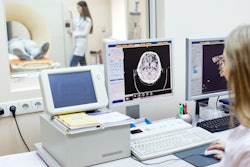Sunday, November 25 | 1:00 p.m.-1:30 p.m. | BR224-SD-SUB1 | Lakeside, BR Community, Station 1
Breast MRI with macrocyclic gadolinium-based contrast agents does not put women at risk for deposits of the agent in the brain, according to this scientific poster being presented on Sunday afternoon.A team led by Dr. Barbara Bennani-Baiti, PhD, of the Medical University of Vienna in Austria, investigated whether women at high risk of breast cancer who regularly undergo contrast-enhanced breast MRI show signal alterations in the dentate nucleus and globus pallidus areas of the brain due to macrocyclic gadolinium-based contrast agents (GBCAs).
The study included 73 healthy women with no history of cancer or neurological disease who received at least six doses gadolinium contrast via a national high-risk screening program for the early detection of breast cancer. The women then underwent 3-tesla/1.5-tesla brain MRI exams to assess whether they had gadolinium deposits resulting from the breast MRI scans.
Bennani-Baiti's team found that neither area of the brain showed alterations after high cumulative dosages of macrocyclic GBCAs.
"Breast MRI being the most sensitive method for breast cancer detection crucially relies on gadolinium-based contrast agents," according to the group. "These findings show that the currently employed macrocyclic gadolinium-based contrast agents do not result in gadolinium deposits in the brain of healthy women participating in a high-risk screening program for early breast cancer detection."





















